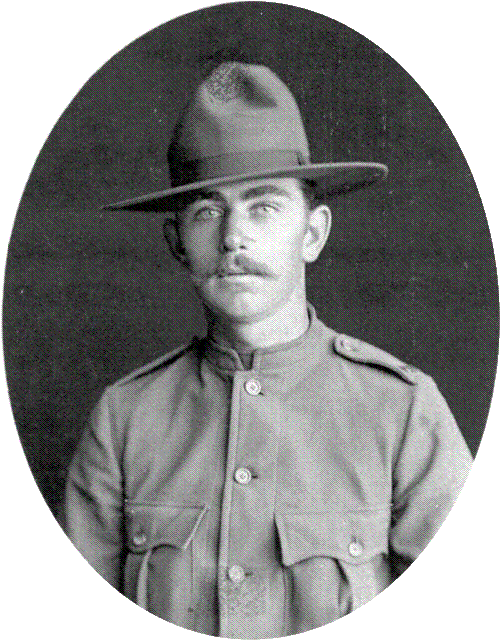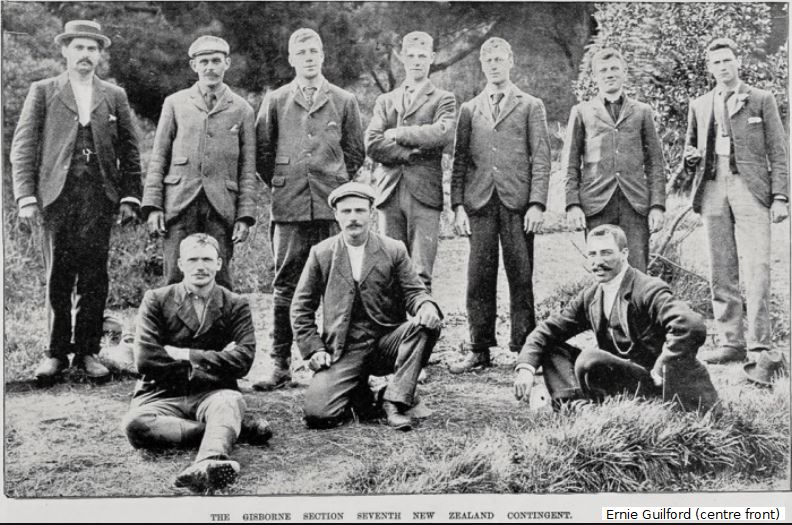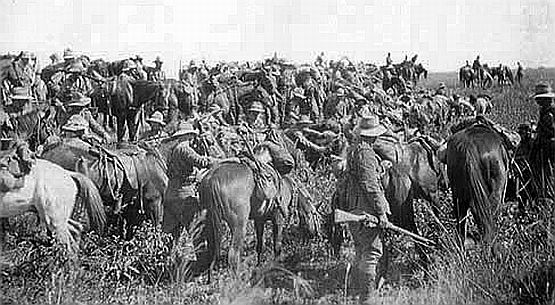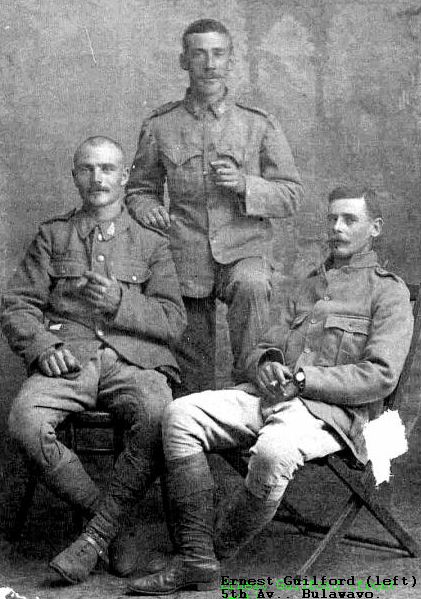|
Ernest Albert Guilford - Boer War 1899 - 1902
Peeney, photo THE SEVENTH CONTINGENT: GISBORNE SECTION. From Left: D. Buckley, N. Law, C. Denny, T. Porter (acting sergeant), T. Arlyle, J. Hanlon; Sitting: W. Cato, E. Guilford, W. Parker, P. W. Tessdale. (Otago Witness, 20 March 1901)

In his early teens Ernie worked in the railway workshops cleaning engines and at home, the small 5 acre farm block provided milk as additional income. He later found employment clearing bush in the Waitotara area and visited cousins in Canterbury. In Feb 1901, Ernie gave his address as Glenroy, Poverty Bay (via Gisborne Post Office) working as a labourer aged 23Y, when he enlisted for the Boer Way. The record of the ten contingents of New Zealand's soldiers in the Boer War are listed in the Appendix to the New Zealand Journal of the House of Representatives for the years 1900, 1901, and 1902. The 7th Contingent included Reg No 4167, Private Ernest Albert GUILFORD. He applied for the Sixth Contingent then was transferred to the 7th Contingent which was raised to replace the Fourth Contingent. In December 1900 South Africa the fighting mainly involved subduing guerilla bands. Under the command of Lord Kitchener the main towns and railways were now held but the Boers hid elusively in the mountains, coming out for food and harrasment. The open veldt country was cleared of people and stock and blockhouses were established in a series of operationsby lines of troops. NZ Prime Minister was requested to send fresh troops to relieve the contingents so they might be sent home and rest - some dissatisfaction was felt that their length of service was longer than other colonial troops. The war had dragged on longer than expected and it was agreed replacements to serve for a period “ such as their services might be required. Training started at Newtown Park in Wellington in February and the 7th Contingent departed on 6 April 1901 from Wellington traveling on the SS Gulf of Taranto with Lieutenant-Colonel Thomas Porter in command and a total strength of 667 and landed in South Africa on 10 May 1901. The small size of the transport ship made it impossible for the contingent to take its own horses.
Ernie was attached to the Quartermaster's store which was a covered wagon. The daily scale of rations for each man was 1 lb fresh or preserved meat, 1 ¼ lb bread or 1 lb biscuit, flour or meal; 2/3 oz coffer or tea; 1/36 oz pepper; ½ lb potatoes or 1 oz dried vegetables; ¼ lb vegetablesor 1 oz dried vegetables; ¼ lb jam; lime juice when ordered by a medical officers. Provisions were found along the way when they went into a town. Ernie said Along with the men, their horses experienced often harsh conditions when limited to a few lbs of wheat a day. The contingent had some success with dawn raids on Boer laagers (camps), which were an important feature of British tactics in the latter part of the war. By late 1901 the number of Boer guerrillas who were still active had been substantially reduced, but thousands of the most determined and effective fighters were still in the field. Expectations of a quick victory were misplaced. With the British holding the main towns and railways, the Boers waged a guerrilla war, , moving fast and operating as small commando groups, sallied forth in quick guerrilla operations. The British responded by clearing the countryside of stock, burning crops and rounding up both Boer and African civilians into concentration camps, including women and children. This was partly so they could not supply food and support to the guerrilla fighters. The 6th and 7th contingents were involved in this. This was not wholly successful, so in the final stages of the war the British left the women and children in the country, built blockhouses and began systematic sweeps to defeat the Boer guerrillas. In February 1902 the Boer leader Christiaan de Wet attempted to break the encroaching line. His men attacked at night with an advance screen of cattle at Langverwacht Hill, or Bothasburg as it was also known, in the Orange Free State. Members of the 7th Contingent were heavily involved and of some 90 men, 24 were killed and 41 wounded, making this the most costly action of the war for New Zealanders. Ernie was discharged 16 Sep 1902. |


 In South Africa, the Seventh Contingent troops were constantly packing up camp and rarely stopping on in one place before again on the move. Their constant need to travel meant minimal supplies and several times New Zealanders were short of food, where-as the Boers were able to exist on the country they were passing through.
In South Africa, the Seventh Contingent troops were constantly packing up camp and rarely stopping on in one place before again on the move. Their constant need to travel meant minimal supplies and several times New Zealanders were short of food, where-as the Boers were able to exist on the country they were passing through.  "Chewing tobacco was cheap - you could buy 12 sticks for a shilling and whisky was quite cheap too" and Ernie would spend all his pay on buying such. Three days out, men would be short of supplies and would be paying him a shilling for a stick of tobacco. He said " I made more money from my dealings than I ever did from my pay in the war."
"Chewing tobacco was cheap - you could buy 12 sticks for a shilling and whisky was quite cheap too" and Ernie would spend all his pay on buying such. Three days out, men would be short of supplies and would be paying him a shilling for a stick of tobacco. He said " I made more money from my dealings than I ever did from my pay in the war."
 Ernies's Military Correspondence
Ernies's Military Correspondence